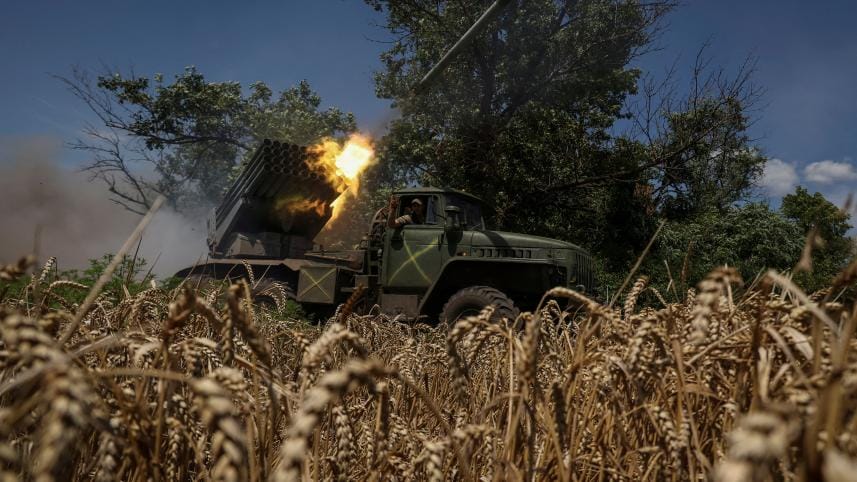Russia’s war in Ukraine is reversing hard-won development gains and destroying global food security

On this day 561 days ago, Russia invaded its neighbour Ukraine. Thousands of Ukrainians are dead. Homes have been destroyed. Atrocities by Russian soldiers are widespread and well documented.
But while Russian President Vladimir Putin's illegal war continues, the devastating effects are being felt far beyond Ukraine. His actions are undermining hard-won development gains and damaging global resilience. Before Russia's invasion, the farmers of Ukraine were feeding 400 million people worldwide. Ukrainian farms produced 8-10 percent of global wheat exports and 10-12 percent of corn and barley exports. Ukraine provided over 50 percent of the wheat for the World Food Programme in 2022; a programme that helps some of the poorest and most vulnerable people in the world.
Putin's cynical military attacks have destroyed over 240,000 tonnes of grain; enough to feed over 1 million people for a year. This means that Russia has destroyed more grain, in the last month alone, than all of the grain it has promised to give to Burkina Faso, the Central African Republic, Eritrea, Mali, Somalia, and Zimbabwe combined.
But Putin is not only destroying much-needed grain today. He is also targeting Ukraine's ability to export agricultural produce in future years. Since Russia's invasion, and subsequent withdrawal from the UN-brokered Black Sea Grain Initiative on 17 July this year, Russia's bombs have systematically targeted civilian infrastructure on the Black Sea. Russia has damaged or destroyed at least 26 port facilities, grain infrastructure (including warehouses, silos and grain elevators), and fuel oil and storage. The Ukrainian government estimates that these attacks have reduced Ukraine's export capacity by 30 percent.
The result of Russia's continued attacks will be long-standing damage to the Ukrainian agricultural sector; a source of food production which has played such a pivotal role in global food supply. Fixing this damage will not happen overnight; the more Russia cuts off Ukraine's ability to export its produce, the more Ukrainian farmers will have to abandon their fields. Russia has committed these acts to hinder the Ukrainian economy, and to ensure the world is more dependent on Russian grain.
This all means that there will be less grain to go around. Putin's actions have exacerbated global food shortages at a time of unprecedented humanitarian need. Independent estimates suggest that Ukrainian wheat production is likely to be over 40 percent lower this year than pre-war levels. It is likely that production will continue to fall given the ongoing uncertainty.
In our interconnected world, where grain markets are global, the inflationary pressures caused by Putin's actions will be felt in every country. And Bangladesh is no exception: food price inflation is causing stress and misery to many and reversing the hard-won development gains that the country is rightly so proud of. In spite of Russia's claims to the contrary, sanctions do not target trade in agricultural and food products, including grain and fertilisers, between Russia and other countries. In contrast, Russia has chosen to weaponise food.
Putin's invasion constitutes a violation of international law, in particular of the UN Charter, and is a serious threat to the international order based on the rule of law, with ramifications well beyond Europe, including in the Indo-Pacific. World leaders will come together in New York in September to work together to tackle climate change, advance our shared sustainable development goals, and invest in the UN Charter. As they do so, Putin will be working to ensure fewer people have access to food.
Russia's illegal war in Ukraine must end, the bombing of civilian infrastructure must cease, and global food supply chains must be restored. Some of the world's poorest people, including here in Bangladesh, are paying the price for Russia's ill-fated adventurism.
H.E. Antonio Alessandro, Ambassador of Italy; H.E. Francisco de Asís Benítez Salas, Ambassador of Spain; H.E. Alexandra Berg von Linde, Ambassador of Sweden; H.E. Jeremy Bruer, High Commissioner of Australia; H.E. Sarah Cooke, High Commissioner of United Kingdom; Jan Janowski, Chargé d'Affaires Germany; Anders B. Karlsen, Chargé d'Affaires Denmark; Helen LaFave, Chargé d'affaires, a.i., Embassy of the United States of America; H.E. Marie Masdupuy, Ambassador of France; H.E. Dr. Lilly Nicholls, High Commissioner of Canada; H.E. Espen Rikter-Svendsen, Ambassador of Norway; H.E. Charles Whiteley, Ambassador of the European Union; Thijs Woudstra, Chargé d'Affaires Kingdom of the Netherlands; and H.E. Young-sik Park, Ambassador of the Republic of Korea.



 For all latest news, follow The Daily Star's Google News channel.
For all latest news, follow The Daily Star's Google News channel.
Comments